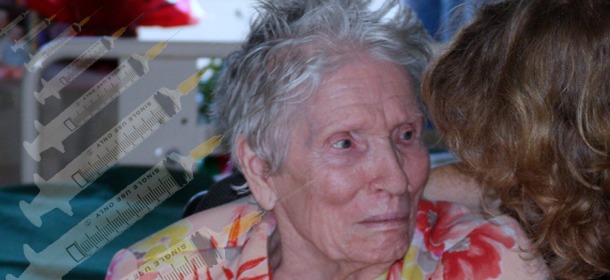Diseases/Conditions
Radioactive Cancer Drug Trial Halted Early for ‘Good Results’: Another Big Pharma Fraud?
 File this under “Too Good to Be True”:
File this under “Too Good to Be True”:
Yet another cancer trial has been halted early for results claimed to be so good that it would be unethical not to give the active drug to the placebo group. Always incapable of turning its back on the latest and greatest from Big Pharma, Cancer Research UK is cheerleading it. And this treatment combines conventional medicine’s two leading killer technologies, radiation and chemotherapy, into one big throat stuffer.
To put this whole thing in perspective: The trial is sponsored by Bayer Schering Pharma, which owns worldwide rights to the radioactive drug. Bayer plans to use the results of this trial to apply for approval in the US and Europe, and the US FDA has given it fast-track status.
The drug, tested for treatment of prostate cancer that has metastasized to bone, is called Alpharadin. It is radium-223 chloride. The radium component is a highly radioactive element that releases alpha particles, the most deadly type of radiation.
Researchers say that Alpharadin is attracted to bone because of its calcium-mimicking properties. They claim that any of the drug not taken up by bone metastases is, according to Medical News Today, “immediately excreted through the gut”. That sounds good, but fails to note that calcium is a mineral used throughout the body. They also fail to note that alpha radiation is so toxic that death can be caused by just a tiny amount.
Alpha particles can travel only a very short distance, an inch or so, and can be easily stopped by physical barriers, even skin. However, Alpharadin is a pill that’s ingested by patients. So, it would seem that the researchers owe us an explanation of how it can simply be passed outside the body through the gut without any chance of being taken up by something other than a bone metastasis.
The Trial Halting Technique
The last decade has brought about a new technique in foisting toxic drugs on trusting patients. Halting trials early with claims and fanfare for near-miraculous results—results that virtually never pan out in real patients—is a brilliant publicity gimmick. In reality, most were stopped before the worst of the adverse effects could show up. That, of course, has resulted in massive harm to patients who are later prescribed those drugs.
In the case of Alpharadin, the benefits at the point of stopping the trial are not even particularly great. It doesn’t save lives. According to the researchers’ claims, the drug group lived an average of 14 months and the placebo group lived an average of 11.2 months. They claimed that adverse events were fairly mild, but as we’ve seen in many other trials, the timing of the halt was carefully selected to hide them. So, we’ll likely find out what harm is done at a much later date—years after the drug has been given its real trial in real patients who are paying, directly or indirectly through insurance or taxes, and Baxter has made a ton of money.
There’s a significant clue that there was something quite strange in the trial’s set up. The placebo group reported more adverse effects than the one taking Alpharadin. Such topsy-turvy results have a tendency to indicate that something was very much awry. Whether it was patient selection, statistical methods, or outright fraud, we don’t know. But regulating agencies need to sort this point out before approval. However, if the history of the FDA is any indication, they’ll likely ignore it.
Alpharadin, the latest spit-shined all-chrome publicity campaign was launched with the drug trial. It seems that the primary use for drug trials is now publicity.
Sources:
- Alpha radiation treats prostate cancers
- Alpharadin Improves Survival in Advanced Prostate Cancer
- Alpharadin (radium-223 Chloride) Improves Prostate Cancer Patient Survival Considerably
- Alpharadin will be new treatment option for prostate cancer
- Halted drug trial safety concerns
- Randomized Trials Stopped Early for Benefit
Tagged alpharadin, alpharadin trial halted, alpharadin trial halted early, baxter alpharadin, baxter fda alpharadin, big pharma, drug trial halted early, modern medicine, pharmaceutical drugs, pharmaceuticals
Related Posts
-
Paul
-
http://blog.anarchic-teapot.net anarchic teapot













